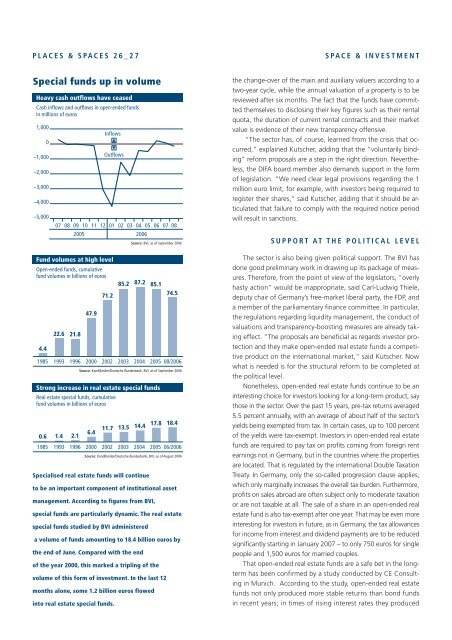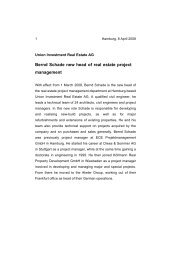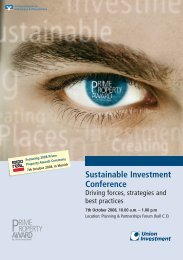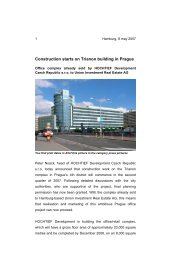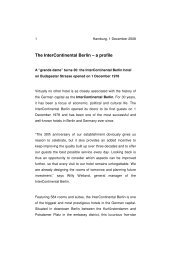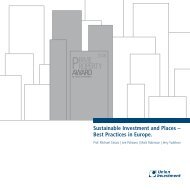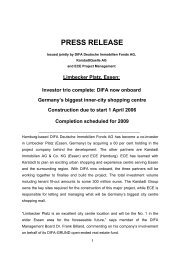BREAKTHROUGH IN THE CITY Why London's ... - Union Investment
BREAKTHROUGH IN THE CITY Why London's ... - Union Investment
BREAKTHROUGH IN THE CITY Why London's ... - Union Investment
Create successful ePaper yourself
Turn your PDF publications into a flip-book with our unique Google optimized e-Paper software.
PLACES & SPACES 26_27 SPACE & <strong>IN</strong>VESTMENT<br />
Special funds up in volume<br />
Heavy cash outflows have ceased<br />
Cash inflows and outflows in open-ended funds<br />
in millions of euros<br />
1,000<br />
–1,000<br />
–2,000<br />
–3,000<br />
–4,000<br />
–5,000<br />
Open-ended funds, cumulative<br />
fund volumes in billions of euros<br />
4.4<br />
0<br />
22.6 21.8<br />
47.9<br />
Inflows<br />
Outflows<br />
07 08 09 10 11 12 01 02 03 04 05 06 07 08<br />
2005 2006<br />
Fund volumes at high level<br />
71.2<br />
Source: BVI, as of September 2006<br />
85.2 87.2 85.1<br />
Strong increase in real estate special funds<br />
74.5<br />
1985 1993 1996 2000 2002 2003 2004 2005 08/2006<br />
Real estate special funds, cumulative<br />
fund volumes in billions of euros<br />
Source: Kandlbinder/Deutsche Bundesbank, BVI, as of September 2006<br />
0.6 1.4 2.1<br />
6.4<br />
11.7 13.5 14.4<br />
17.8 18.4<br />
1985 1993 1996 2000 2002 2003 2004 2005 06/2006<br />
Source: Kandlbinder/Deutsche Bundesbank, BVI, as of August 2006<br />
Specialised real estate funds will continue<br />
to be an important component of institutional asset<br />
management. According to figures from BVI,<br />
special funds are particularly dynamic. The real estate<br />
special funds studied by BVI administered<br />
a volume of funds amounting to 18.4 billion euros by<br />
the end of June. Compared with the end<br />
of the year 2000, this marked a tripling of the<br />
volume of this form of investment. In the last 12<br />
months alone, some 1.2 billion euros flowed<br />
into real estate special funds.<br />
the change-over of the main and auxiliary valuers according to a<br />
two-year cycle, while the annual valuation of a property is to be<br />
reviewed after six months. The fact that the funds have committed<br />
themselves to disclosing their key figures such as their rental<br />
quota, the duration of current rental contracts and their market<br />
value is evidence of their new transparency offensive.<br />
“The sector has, of course, learned from the crisis that occurred,”<br />
explained Kutscher, adding that the "voluntarily binding"<br />
reform proposals are a step in the right direction. Nevertheless,<br />
the DIFA board member also demands support in the form<br />
of legislation. “We need clear legal provisions regarding the 1<br />
million euro limit, for example, with investors being required to<br />
register their shares,” said Kutscher, adding that it should be articulated<br />
that failure to comply with the required notice period<br />
will result in sanctions.<br />
SUPPORT AT <strong>THE</strong> POLITICAL LEVEL<br />
The sector is also being given political support. The BVI has<br />
done good preliminary work in drawing up its package of measures.<br />
Therefore, from the point of view of the legislators, “overly<br />
hasty action” would be inappropriate, said Carl-Ludwig Thiele,<br />
deputy chair of Germany’s free-market liberal party, the FDP, and<br />
a member of the parliamentary finance committee. In particular,<br />
the regulations regarding liquidity management, the conduct of<br />
valuations and transparency-boosting measures are already taking<br />
effect. “The proposals are beneficial as regards investor protection<br />
and they make open-ended real estate funds a competitive<br />
product on the international market,” said Kutscher. Now<br />
what is needed is for the structural reform to be completed at<br />
the political level.<br />
Nonetheless, open-ended real estate funds continue to be an<br />
interesting choice for investors looking for a long-term product, say<br />
those in the sector. Over the past 15 years, pre-tax returns averaged<br />
5.5 percent annually, with an average of about half of the sector’s<br />
yields being exempted from tax. In certain cases, up to 100 percent<br />
of the yields were tax-exempt. Investors in open-ended real estate<br />
funds are required to pay tax on profits coming from foreign rent<br />
earnings not in Germany, but in the countries where the properties<br />
are located. That is regulated by the international Double Taxation<br />
Treaty. In Germany, only the so-called progression clause applies,<br />
which only marginally increases the overall tax burden. Furthermore,<br />
profits on sales abroad are often subject only to moderate taxation<br />
or are not taxable at all. The sale of a share in an open-ended real<br />
estate fund is also tax-exempt after one year. That may be even more<br />
interesting for investors in future, as in Germany, the tax allowances<br />
for income from interest and dividend payments are to be reduced<br />
significantly starting in January 2007 – to only 750 euros for single<br />
people and 1,500 euros for married couples.<br />
That open-ended real estate funds are a safe bet in the longterm<br />
has been confirmed by a study conducted by CE Consulting<br />
in Munich. According to the study, open-ended real estate<br />
funds not only produced more stable returns than bond funds<br />
in recent years; in times of rising interest rates they produced


